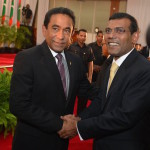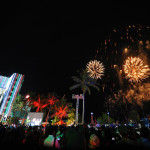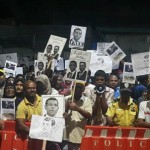An “economic tsar” or a “tyrant” is essential for a business to succeed, President Abdulla Yameen said at a ceremony held last night to celebrate local investment company Alia’s 50th anniversary.
While business decisions are made in boardrooms after considering social factors, President Yameen said economic decisions should be taken by “someone with an economic mindset.”
“Success for a business is to have an economic tsar or an economic tyrant leading it,” said Yameen, addressing Alia’s senior management.
Alia Group has remained successful for so long because it is a “strong family business,” Yameen suggested.
“There cannot be many owners in a business. Businesses will get suggestions from the board, but when it comes to decisions, if there is one person who makes the decisions, it is more efficient,” he added.
Alia – founded by the late Ali Abdulla, father of former first lady Laila Ibrahim – started out in the early 1960s as Alia carpentry, before expanding into the construction industry.
Ten years later, the company reached an agreement with Yamaha, and introduced the Yamaha outboard engine to the Maldives, still being widely used in the transportation industry.
President Yameen praised Ali Abdulla for his vision and forward thinking, adding that under his management Alia had transformed the construction industry whilst revolutionising sea transportation with the introduction of the Yamaha engine.
Economy and investments
Yameen went on to say that the government is aiming toward increasing the rate of economic growth in the Maldives.
“The GDP growth this year is estimated at eight percent or higher,” he said.
“This growth, when compared to other countries and our close neighbour’s sluggish two to three percent growth, is a very vibrant economic situation.”
Last year, the government enacted its its flagship Special Economic Zones (SEZs) Act, which President Yameen’s administration insists would attract large scale foreign direct investments.
While the government forecasts it will receive US$ 100 million as acquisition fees for the SEZs by August 2015, the opposition has criticised the lack of significant foreign investments despite assurances from the government.
Last night, Yameen said peace and stability in the Maldives together with the government’s policies would spark interest from potential foreign investors.
“If we are able to grab the attention of the investors, and with the current direction of the economy, there will be big infrastructure projects in the future,” said Yameen.
Such investments would provide opportunities for local construction companies and create employment opportunities for the youth, he said.
“Sovereign guarantee”
President Yameen last night reiterated the government’s pledge to provide sovereign guarantees on loans to develop new resorts, noting that that the tourism industry offers “lucrative” employment opportunities for youth.
The economy does not benefit if resort development on islands leased by the government remains stalled for eight or 12 years, Yameen said.
“The rent for the islands might go into MIRA [Maldives Inland Revenue Authority],” he continued.
“However, the opportunity cost of the eight years is much higher. Imagine the amount of dollars which would cumulate and roll through the resort if it had been developed.”
Last year, the cabinet’s economic council announced plans to remove import duty on construction material needed for the refurbishments of resorts, in order to stimulate resort development.
Correction: This article previously identified Alia’s founder as Ali Ibrahim. This is incorrect. Alia was founded by Ali Abdulla.
Related to this story
Foreign investments worth MVR9.8 billion expected in five years, says President Yameen
Parliament approves state budget for 2015 with 60 votes in favour
PPM celebrates SEZ bill with fireworks
INIA capacity will increase threefold with new runway and terminal, says economic council





A tyrant can only function in a tyrannical environment. Change to a positive environment and he will be irrelevant
There is no justificatiob for tyranny
Maybe the can give Putin asylum
What about Gasim ? you better patch-up with him and try to get him in your camp again. Gasim is quite Flexible.
The things this Yameen dude says are so dumb, every person who has passed grade 3 should know it makes no sense.
Oooh sounds like a mafia don in the business of thuggery , preaching about an "economic tsar" yadda yadda... Yes a "tyrant" is good for this particular family business indeed! Seems to have forgotten the "business" of civic responsibility, the serious "business" of running a smallish country with lots of other not so business minded souls in it... ohhh the heady scent of power and money! So very good for one's over- inflated ego! Yo! We are still so early in the cycle of illusory money- seeking as the end to all misery.... way to go yet... before those will full pockets realize there is no way out of escaping life and its surprises...
A country of corrupt and biased judges. Incompetent and corrupt police. Corrupt government officials. Brutal treatment of citizens. Total disregard for international norms of behaviour.
The Foreign Minister warns foreigners to stay away. The President talks about "business tyrants" (whatever that is) and behaves like a cross between a Roman Emperor and Rihanna in Parliament.
And they want us foreigners to bung in millions of dollars in Special Economic Zones!
Suppose I brought my millions and invested it. Then I have a problem with my Maldivian partner who happens to be a government minister who claims to be connected with the President.
What hope do I have of getting justice in Court?
Suppose I lived in Male' at this time.
What hope do I have of avoiding the fate of parliamentarians or journalists or ex-ministers or any others who had "issues" with powerful people?
Maldives welcomes investors with open arms. Just make sure they dont grab your money and throw you in jail on false charges.
Or drown you in the deep blue sea?
For someone who claims to be a trained economist, the President seems to be confused in his use of potentially meaningless jargon. As someone who makes a meagre living from researching the subject, I struggled to understand what he meant.
What is the point he's trying to prove when he contrasts "business decisions" with "economic decisions" in his speech, or the importance of "tyrants" in business? The vagueness adds to the confusion; the comparison is possibly a category mistake.
My understanding (very briefly):
Business decisions are mainly in the domain of the private sector, and are dominated by considerations of profit. Factors that contribute to profit growth, such as market development and identification of suitable opportunities are the main drivers. Those responsible for the operation of the business are answerable to the shareholders (owners), and shareholder interests are what counts most.
The largest and most successful companies are in fact owned by many millions of people, and not one or a few owners as the President appears to claim - think of Apple, Exxon, Coca Cola.
While Steve Jobs undoubtedly was an individual who carried a great deal of influence and had the creative vision to deliver success for Apple, this is very much an exception. Apple's success would not have been achieved without the very different skills but nevertheless citically important contributions from Tim Cook and many other senior members of the executive team.
By way of contrast, the large banks and insurance firms which contributed to the recent financial crisis were very much dominated by one-man shows, with Robert Fuld of Lehman Brothers a good example of what happens when a "tyrant" dominates a business.
The President's other category, Economic decisions, are a matter for the public sector. These are more concerned with social issues such as job creation and geographic development that generates employment and opportunities which will hopefully attract more business. Business profitability is of secondary importance - maximising per capita income (per capita GNI is the World Bank's most generally accepted standard) is the main easily comparable measure of success. Those who make the decisions are theoretically answerable to the community ("the people").
Statistically and historically, communities that are functioning liberal democracies have fared significantly better than so-called "command economies" or, as the President mentions, "tyrannies", though that is a term that needs clearer definition. The OECD countries (the "Rich Man's Club") are the obvious examples.
Here again, there may be exceptions but very few; the only one I can think of is perhaps Singapore (US$54040), which has a per-capita GNI in the same league as the OECD (though their economists argue unconvincingly that they are still a developing country and should not be considered OECD material).
Singapore is an interesting case. While not a conventional liberal democracy, it is certainly no "tyranny" by any measure. It shares many features in common with the most successful liberal democracies in the world: Freedom of belief, equality before the law, control of corruption (evidenced by its huge reserves), an efficient and functioning bureaucracy. I should add that I feel safer walking at night in Singapore than on the campuses of Yale or MIT (which are actually very safe)!
Maldives (US$5600) and China (US$6560) are both Upper Middle Income countries by this measure (though the aggregate measure for China will soon make it the largest economy in the world, its per capita GNI will still remain somewhere in the middle). I mention China in this context because there are some (not very persuasive) arguments that China has done well as a tyranny, but I would think that its continuing efforts to reduce "tyranny" is what contributes to its growth.
To conclude, I would respectfully submit that accountable, responsible and responsive leadership delivers more consistent and reliable results in both public and private spheres. "Tyrants" of any type do not have a place in the modern business, or in the modern economy.
@Mark
Here's a tip before you do business in Maldives. Make friends with mercenary groups, big military people, corrupt generals and criminal organizations.
So when Maldives governments double-cross you, you can simply bring in a few gunboats to Mal'e and use artillery to raze a few palaces and the Maldivian government will name you "Supreme God-Emperor of Maldives for Life" in exchange for amnesty.
Yes, they have no real air power. All the military and police are good at is beating up unarmed civilians.